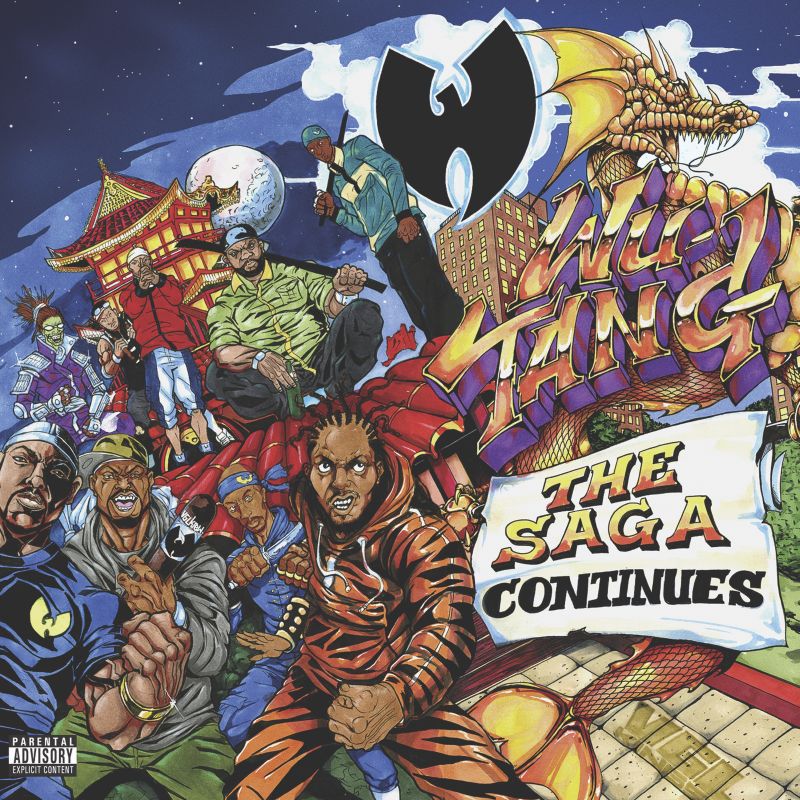Wu-Tang Clan release full-length ‘The Saga Continues’
by Andrew Szendrey
2017-11-15

Wu-Tang Clan
The Saga Continues
36 Chambers, LLC · October 13, 2017

Wu-Tang drops a revival album to remind everyone that their simple, funky beats, smooth verse transitions, and stream of consciousness-style rap are still capable of addressing deeply rooted social and political divides.
“2017… Another Wu-Saga” – ‘Wu-Tang: The Saga Continues Intro’
Wu-Tang never died. In fact, they’ve never been better. The proof lies in their newest album: The Saga Continues.
This release comes 24 years after the conglomerate of Staten Island’s best rappers released Enter the Wu-Tang. That album (and the group itself) has since been known as a foundation from which all rap since has been built upon. Wu-Tang is proud of their accomplishments and their novelty, but they have some qualms with modern rap.
“I’m pushing lyrics while rappers are pushing gimmicks.” – ‘Frozen’
The Clan’s biggest complaint? “They spread the propaganda so we cannot prosper.” The Wu-Tang Clan comes back to this issue multiple times throughout the album, pointing out that many artists are writing politically so that more people will listen. They feel that modern artists lack sincerity and the ability to write passionately.
Instead of sitting back and watching the genre they built fall down, The Wu-Tang Clan wrote an album just as good as all of their first — it does not belong in this decade, it’s too good.
The album is 18 tracks long with an introduction, 4 “skits,” and an outro, many of which contain audio clips incorporated sometimes loosely but always coherently. The Wu-Tang’s typical use of audio clips add to the retrospective nature of the album by reinforcing the ideals of older generations through clips of old speeches and shows.
“They didn’t tell us that if you give up the man, you’re gonna take one of these things, it gets worse and would destroy your nation” – ‘Family (Skit)’
The Wu-Tang Clan devotes a good chunk of spin time to discussing generational differences. Those generational differences have crept their way into every aspect of society, and The Clan thinks that rap culture is to blame for the negative impacts. Gender gaps are perpetuated by male rappers who are incapable to “use proper grammar” and talk about anything besides sex and drugs. They’re not saying stop talking about sex and drugs, they’re saying talk about sex and drugs and how they can turn a life upside down. They’re not saying play nice with the cops, they’re saying be an outlet for kids so they don’t pick up a gun and shoot back. They’re not saying settle for Trump, they’re saying hopping on twitter to start a fight isn’t going to solve the racism behind his election.
“Babies having babies… that’s a product of home training.” – ‘People Say’
The discourse on socioeconomic issues is brought up in a more indirect way on this album. In the crisp and clean song with strong male gospel vocals, ‘People Say,’ the Clan brings up an aspect of youth culture that hasn’t been discussed since MTV’s “16 & Pregnant” fell in the ratings: teenage pregnancy. Nobody’s talking about it, and that’s The Clan’s worst case scenario. Because it matters, and the Wu-Tang is aware that, “we have some serious relationship problems.”
Sex sells. But it doesn’t convey what’s going on in the brain of an artist. And if all artists have left to talk about is sex, not what it’s like to be a teenage parent, or how parental responsibility that disproportionately affects minorities, then (according to the perspective of The Wu-Tang Clan) modern rap culture has failed the youth of today.
“Now do you understand? The only way we can stay strong is if we stick together. Because they gonna try and make black and white go against each other, which they can’t, because we already havin’ a good time.” – ‘If What You Say is True’
This quote sounds about as superficial as the crowd’s cheers in the nightclub the audio clip were taken from. I wish I could believe it, but I don’t, and I don’t think the Clan does either. I think they threw it in there to remind people how prevalent the appropriation of Black Culture by white youth is.
So often, artists will write for the general audience that they expect their music to reach. But when experiences are only shared on the surface-level with the audience, the true meaning of the lyrics is lost in an attempt to appeal broadly. The Wu-Tang wrote prolifically throughout their career about experiences that they went through in a predominantly black community, and they want to bring back the quality of music that a true perspective on life as a minority is capable of providing.
“I have nothing but respect for our young people and what they’re doing, my thing is that we as adults did not stand and are not square to bring our young people through our process.” – ‘Message’
The Wu-Tang Clan has a lot of problems with modern rap culture, but at the end of their newest album, they want to make one thing very clear: they’re not mad at the kids listening to the music, they’re mad at the people making it. The penultimate track on the album, ‘Message,’ which acts as an outro for the outro, contains the words of Kabe Hiawatha Kamene reflecting on the black community. His words profoundly underline the message that Wu-Tang has for the younger generation of black people.
Per usual, The Wu-Tang Clan did not upset. In fact, 24 years later: “Wu-Tang rocks the world.”
